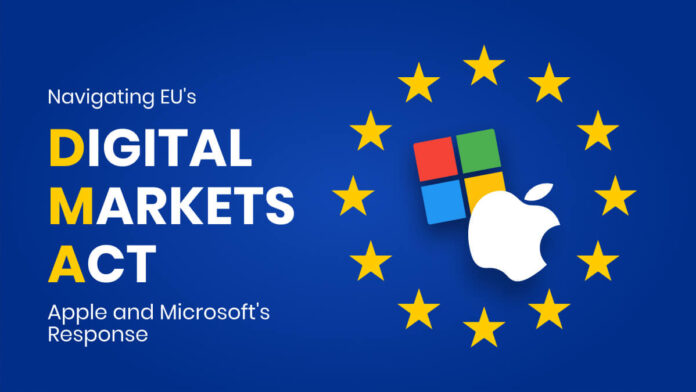In anticipation of the European Union’s Digital Markets Act (DMA) coming into effect in early March, tech giants such as Apple and Microsoft are undergoing significant transformations to align with the legislation’s provisions. Designated as “gatekeepers,” these companies face stringent regulations to foster fair competition within the digital landscape. Here’s a closer look at how Apple and Microsoft are navigating the DMA landscape:
Apple’s Strategic Contemplation
Apple’s approach appears notably subdued as the DMA deadline looms, eliciting speculation within industry circles. While the company has refrained from overt challenges to its gatekeeper designation, its measured response prompts questions about its strategic considerations amidst regulatory upheaval.
Analysts observe Apple’s historically guarded stance on regulatory matters, characterized by a preference for behind-the-scenes engagement rather than public confrontation. While consistent with Apple’s corporate ethos, this approach leaves room for interpretation regarding its compliance strategy under the DMA.
Microsoft’s Proactive Adaptation
In contrast, Microsoft emerges as a proactive player in DMA compliance, unveiling strategic adjustments to its Windows 11 ecosystem tailored for users within the European Economic Area (EEA). These modifications, including turning off Bing web search and incorporating custom web search providers, underscore Microsoft’s commitment to meeting DMA mandates.
By enabling users to personalize their search preferences and facilitating the removal of pre-installed apps, Microsoft seeks to enhance user autonomy and promote competitive choice within its operating system. The company’s proactive stance reflects a nuanced understanding of regulatory imperatives and a willingness to adapt swiftly to evolving market dynamics.
TikTok and Meta’s Appeal Dynamics
Meanwhile, TikTok’s decision to challenge its gatekeeper status alongside Meta underscores the complexity of DMA designations within the social media sphere. TikTok’s assertion of limited value and attribution of the designation to its association with Chinese parent company ByteDance highlight the nuanced considerations in gatekeeper determinations.
Meta’s parallel appeal signals a unified front among tech incumbents in contesting the DMA’s regulatory constraints. The company’s proactive engagement reflects a broader industry trend towards strategic legal maneuvering in response to regulatory interventions.
Industry-wide Implications
As the DMA’s enforcement looms, the tech industry braces for a paradigm shift in regulatory oversight, with ramifications extending beyond individual companies to reshape market dynamics. The interplay between regulatory imperatives and corporate strategies underscores the evolving terrain of digital governance within the EU.
Stakeholders closely monitor Apple and Microsoft’s responses as bellwethers of industry adaptation strategies under the DMA. Whether characterized by cautious contemplation or proactive adaptation, their approaches hold significant implications for industry competition, consumer welfare, and the broader regulatory landscape.
The DMA heralds a new era of regulatory scrutiny, compelling tech giants like Apple and Microsoft to navigate a complex regulatory landscape while balancing strategic imperatives. As the deadline for compliance approaches, the industry awaits further developments, poised for a transformative shift in the digital marketplace.


